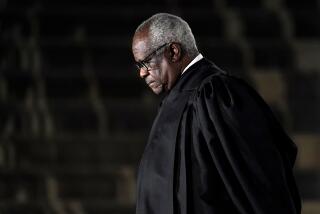Congress Pay Lawsuit Hearkens to 1787
- Share via
WASHINGTON — Two hundred years ago in Philadelphia, the delegates to the Constitutional Convention debated throughout one August afternoon about how to pay members of Congress. Should states pay their own representatives? Perhaps salaries could be linked to the price of a key commodity, such as wheat, one delegate proposed.
In the end, the convention decided that Congress would establish its own pay levels “by law.” This method would work best to keep salaries in check, the delegates concluded, because the public could see how their legislators voted.
As James Madison put it: “The certainty of incurring the general detestation of the people will prevent abuse.”
Key in Lawsuit
That debate, on Aug. 14, 1787, has emerged as a key item in a lawsuit filed this month seeking to have the recent $12,100 pay raise for members of Congress declared unconstitutional. The National Taxpayers Union, consumer activist Ralph Nader and six members of Congress contend that the current approach to setting salaries violates the Constitution because it allows legislators to get a pay raise without voting for one.
Under the 1985 Salary Act, Congress gave the President the power to set the pay rates he “deemed advisable” for legislators, judges and top federal officials. These pay scales take effect automatically within 30 days unless rejected by the Senate and House.
In February, House leaders carefully waited until one day past the deadline so they could cast a meaningless vote to reject their automatic pay raise. The Senate had voted “no” earlier.
“You get to vote no and grab the dough,” says attorney Alan B. Morrison of the Public Citizen Litigation Group, who helped to prepare the suit. This pay setting arrangement contradicts the intent of the Constitution’s authors, he said, because it “enables individual members (of Congress) to deceive their constituents about their position on a matter they knew would be unpopular.”
Attorneys for the Justice Department, as well as the House and Senate, defended the law in a federal District Court appearance June 8. In legal briefs, government attorneys urged U.S. District Judge Louis Oberdorfer to dismiss the suit on jurisdictional grounds, contending that taxpayers have no standing to challenge the law.
The department also contends that Congress has the legal authority to delegate its power over salaries to others, including the President. Moreover, “nothing in the Salary Act prohibits Congress from altering, amending or repealing the salary levels” set by the President, the brief says.
In attacking the department’s defense, Morrison quoted Atty. Gen. Edwin Meese III. In a series of speeches marking the bicentennial of the Constitution, Meese has contended that judges should rely on the language of the Constitution and “the original intention” of its framers in deciding disputes.
The salary for House and Senate members rose from $77,400 to $89,500 this year under the disputed arrangement. An appointed pay commission had recommended salaries of $135,000 for legislators, but President Reagan scaled back these figures before submitting them to Congress in January.
Oberdorfer, who is considering whether this arrangement is constitutional, also benefited from it. His salary as a federal district judge rose from $81,000 to $89,500 this year. But, regardless of his decision, the raise for the judiciary is ensured, in the view of most lawyers, because the Constitution forbids cutting salaries of judges.
More to Read
Get the L.A. Times Politics newsletter
Deeply reported insights into legislation, politics and policy from Sacramento, Washington and beyond. In your inbox twice per week.
You may occasionally receive promotional content from the Los Angeles Times.











